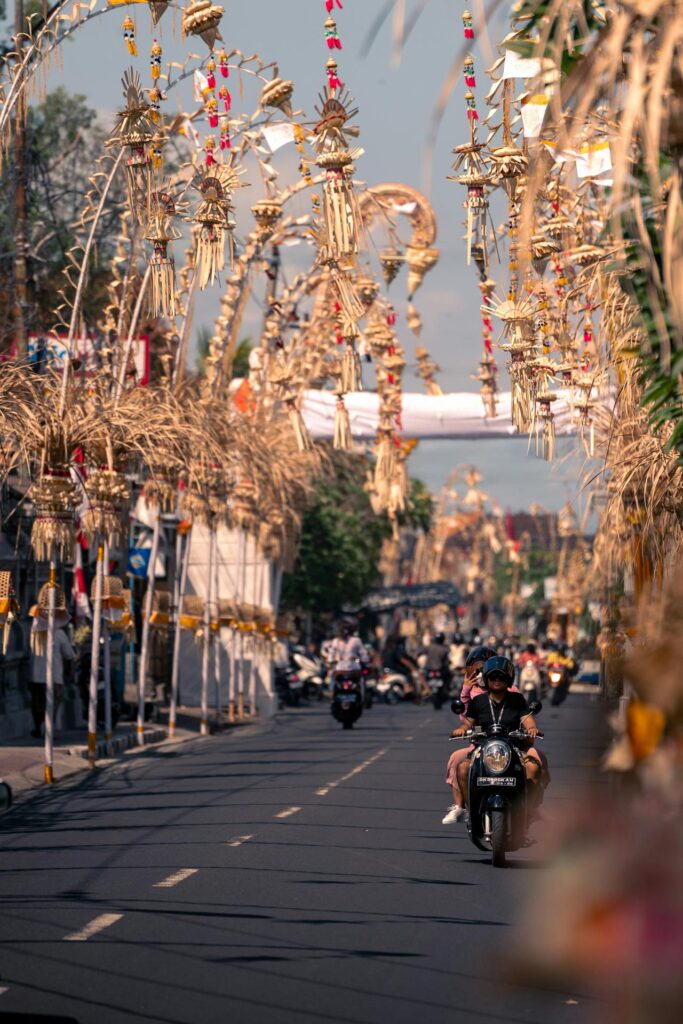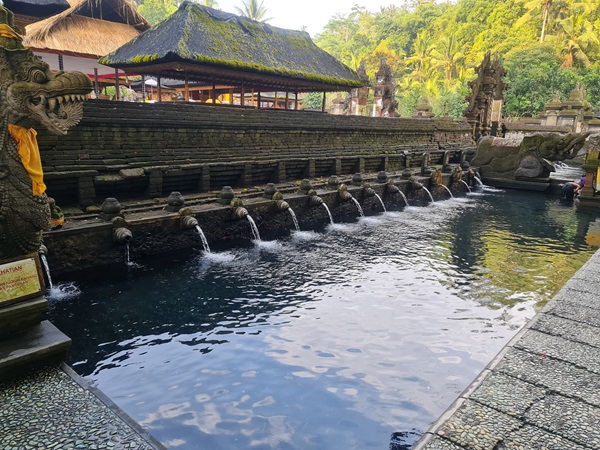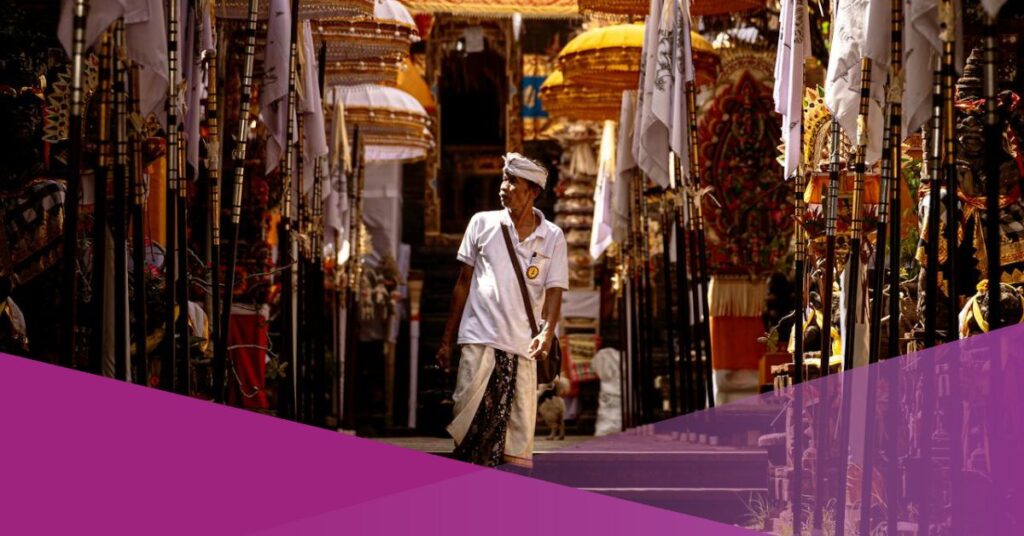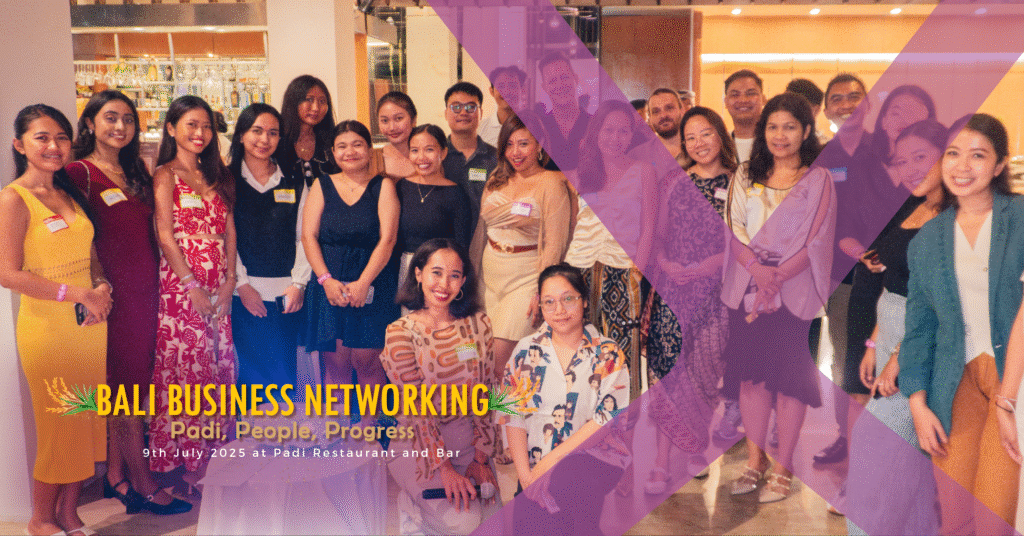Hari Raya Galungan is one of the Hindu festivals celebrated by Hindus in Bali. This celebration has a deep meaning for Hindus, as it is considered a day of victory of Dharma (good) against Adharma (evil). Balinese culture is deep and stems from Balinese Hinduism.
Galungan is celebrated by Balinese Hindus every 210 days using the Balinese calendar.
Tradition in Bali: Hari Raya Galungan – History, Meaning, and Events
Galungan in the Old Javanese language means to fight. Galungan is also called “Dungulan”, which means winning. Galungan is a day when Hindus commemorate the creation of the universe and everything in it.
As a form of thanksgiving, Hindus give and make offerings to Sang Hyang Widhi and Dewa Bhatara (with all their manifestations).
Galungan Day celebrations are synonymous with penjor being placed on the side of the road, decorating the natural highway.
Penjor is a bamboo pole that is decorated in accordance with local Balinese traditions. Penjor installed on the roadside is an offering to Bhatara Mahadewa.
What is Galungan?

Other than Nyepi, Galungan is one of the most important balinese culture celebrated by Hindus in Indonesia, especially in Bali.
Galungan itself comes from the word galung, which means jaya or victory, so Galungan Day is celebrated to commemorate the victory of Dharma (good) over Adharma (evil), which is observed every six months.
Galungan in the Old Javanese language means to fight. Galungan is also called “Dungulan”, which means winning.
During the Galungan celebration, Hindus make various offerings to the gods, deity, and their ancestors in the form of traditional balinese offerings, flowers, and dance performances.
In addition, Balinese people also perform unique traditions such as installing penjor in front of houses, which are bamboo poles decorated with coconut leaves, flowers, and various other decorations.
Meaning of Galungan Day
Galungan is a holy day celebrated by Hindus to commemorate the creation of the universe and its contents. In addition, Galungan is also a symbol of the victory of good (Dharma) over evil (Adharma).
During this celebration, Hindus perform various ceremonies and prayers as a form of gratitude and a reminder of the importance of maintaining a balance between Dharma and Adharma in everyday life.
The meaning of Galungan for Hindus is profound, and they are reminded to uphold Dharma always, both spiritually and in daily actions. The victory of Dharma over Adharma in humans is expected to bring happiness, peace, and inner calm.
The word ‘Galungan’ comes from the Old Javanese language meaning ‘fight’, referring to the battle between good and evil. Although the term is also known in Java as wuku Galungan, in Bali it is called wuku Dungulan, but it carries the same meaning.
According to various sources believed by Hindus, including lontar and other historical records, Galungan celebrations have existed for a long time and are celebrated with great spirit by Hindus throughout Indonesia, especially in Bali. Since then, Galungan has become one of the most important holidays in the Hindu calendar.
Tradition in Bali: The Series of Galungan Ritual
- Tumpek Wariga (performed 25 days before)
- Javanese Sugihan (performed on Thursday Wage wuku Sungsang)
- Balinese Sugihan (performed on Friday Kliwon wuku Sungsang)
- Hari Penyekeban (performed on Sunday Pahing wuku Dungulan)
- Penyajan Day (performed on Monday Pon wuku Dungulan)
- Penampahan Day (performed the day before Galungan or Tuesday Wage wuku Dungulan)
- Galungan Day (Wednesday Kliwon wuku Dungulan)
- Hari Umanis Galungan (performed on Thursday Umanis wuku Dungulan)
- Pemaridan Guru Day (performed on Saturday Pon wuku Galungan)
- Ulihan (performed on Sunday Wage wuku Kuningan)
- Pemacekan Agung Day (performed on Monday Kliwon wuku Kuningan)
- Kuningan Day (10 days after)
- Hari Pegat Wakan (Wednesday Kliwon wuku Pahang, a month after)
There are several activities carried out by Hindus during Galungan celebrations, such as praying at home, praying in temples, and giving offerings to Sang Hyang Widhi.
In addition, in Bali culture and traditions, the Galungan Day celebration is closely associated with the installation of penjor that decorates the roadside. Penjor is a bamboo pole decorated in accordance with the custom of the local Balinese community.
Visit Bali During Galungan
Galungan is the best time to visit the island of the gods and experience Balinese culture and traditions. Here are some activities that expats or foreign tourists can do during this time.
Witness the amazing religious ceremonies in Bali temples
Galungan celebrations begin with local people gathering at various temples to pray and express gratitude. One of the most sacred places to witness this is Besakih Temple, which is known as the largest and holiest temple complex in Bali, located on the slopes of Mount Agung.

Do the melukat ritual
Lately, the purification ritual or “melukat” has been widely talked about on social media. This ritual is recommended to be followed the day after Galungan celebrations at Tirta Empul Temple, which is famous for its holy spring water and cleansing rituals.
Melukat aims to cleanse the body and soul, improve spiritual well-being, and provide deeper inner peace and tranquillity. Not far from Tirta Empul Temple, there is a private cabin inn surrounded by gardens and outdoor baths.
For foreign tourists planning to visit Bali during this celebration, do not forget to always be polite, ask permission before participating, and follow local customs and guidelines for dress code when attending sacred ceremonies.
The Balinese people generally appreciate visitors who show genuine interest in and respect for their traditions.
Cover: Foto oleh Dmitry Voronov/Pexels
































